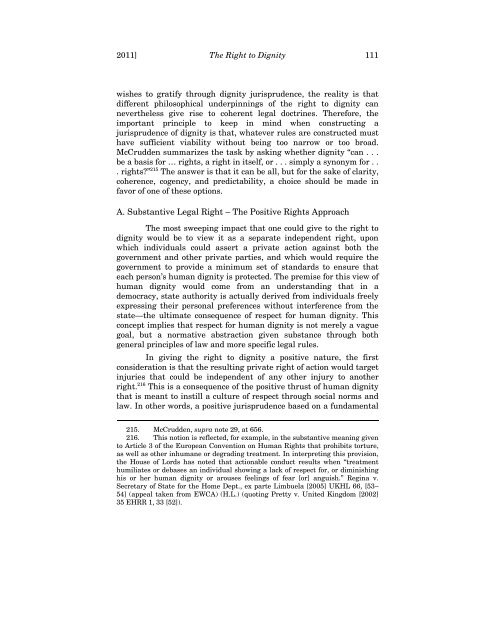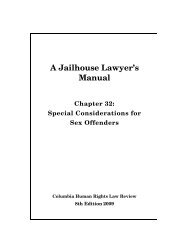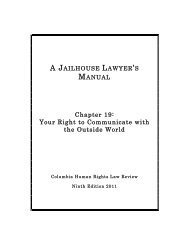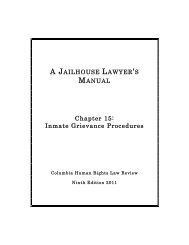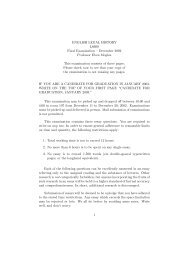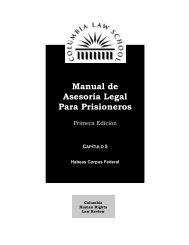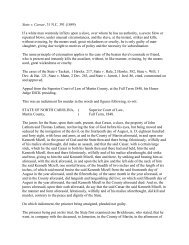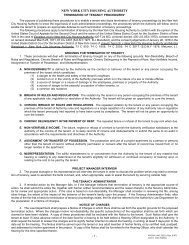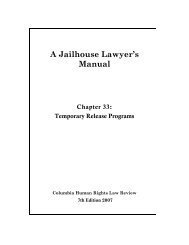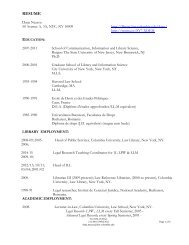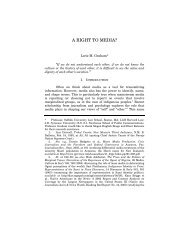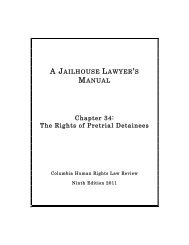The Right to Dignity Rex D. Glensy - Columbia Law School
The Right to Dignity Rex D. Glensy - Columbia Law School
The Right to Dignity Rex D. Glensy - Columbia Law School
You also want an ePaper? Increase the reach of your titles
YUMPU automatically turns print PDFs into web optimized ePapers that Google loves.
2011] <strong>The</strong> <strong>Right</strong> <strong>to</strong> <strong>Dignity</strong> 111<br />
wishes <strong>to</strong> gratify through dignity jurisprudence, the reality is that<br />
different philosophical underpinnings of the right <strong>to</strong> dignity can<br />
nevertheless give rise <strong>to</strong> coherent legal doctrines. <strong>The</strong>refore, the<br />
important principle <strong>to</strong> keep in mind when constructing a<br />
jurisprudence of dignity is that, whatever rules are constructed must<br />
have sufficient viability without being <strong>to</strong>o narrow or <strong>to</strong>o broad.<br />
McCrudden summarizes the task by asking whether dignity “can . . .<br />
be a basis for … rights, a right in itself, or . . . simply a synonym for . .<br />
. rights?” 215 <strong>The</strong> answer is that it can be all, but for the sake of clarity,<br />
coherence, cogency, and predictability, a choice should be made in<br />
favor of one of these options.<br />
A. Substantive Legal <strong>Right</strong> – <strong>The</strong> Positive <strong>Right</strong>s Approach<br />
<strong>The</strong> most sweeping impact that one could give <strong>to</strong> the right <strong>to</strong><br />
dignity would be <strong>to</strong> view it as a separate independent right, upon<br />
which individuals could assert a private action against both the<br />
government and other private parties, and which would require the<br />
government <strong>to</strong> provide a minimum set of standards <strong>to</strong> ensure that<br />
each person’s human dignity is protected. <strong>The</strong> premise for this view of<br />
human dignity would come from an understanding that in a<br />
democracy, state authority is actually derived from individuals freely<br />
expressing their personal preferences without interference from the<br />
state—the ultimate consequence of respect for human dignity. This<br />
concept implies that respect for human dignity is not merely a vague<br />
goal, but a normative abstraction given substance through both<br />
general principles of law and more specific legal rules.<br />
In giving the right <strong>to</strong> dignity a positive nature, the first<br />
consideration is that the resulting private right of action would target<br />
injuries that could be independent of any other injury <strong>to</strong> another<br />
right. 216 This is a consequence of the positive thrust of human dignity<br />
that is meant <strong>to</strong> instill a culture of respect through social norms and<br />
law. In other words, a positive jurisprudence based on a fundamental<br />
215. McCrudden, supra note 29, at 656.<br />
216. This notion is reflected, for example, in the substantive meaning given<br />
<strong>to</strong> Article 3 of the European Convention on Human <strong>Right</strong>s that prohibits <strong>to</strong>rture,<br />
as well as other inhumane or degrading treatment. In interpreting this provision,<br />
the House of Lords has noted that actionable conduct results when “treatment<br />
humiliates or debases an individual showing a lack of respect for, or diminishing<br />
his or her human dignity or arouses feelings of fear [or] anguish.” Regina v.<br />
Secretary of State for the Home Dept., ex parte Limbuela [2005] UKHL 66, [53–<br />
54] (appeal taken from EWCA) (H.L.) (quoting Pretty v. United Kingdom [2002]<br />
35 EHRR 1, 33 [52]).


